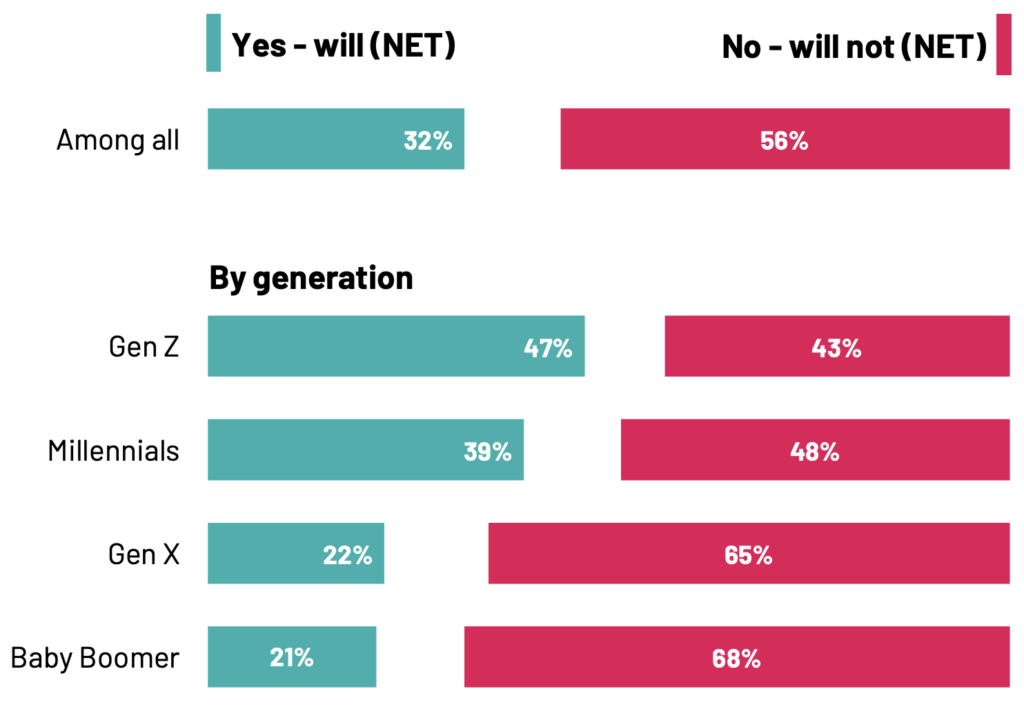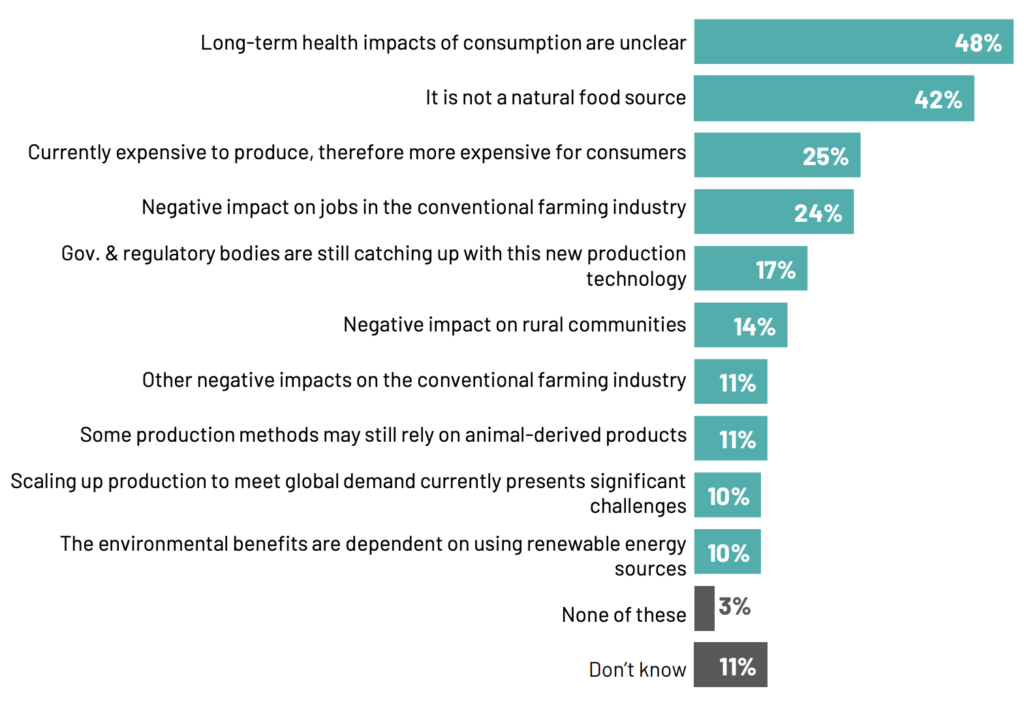
While young men are driving the rise in meat consumption in the UK, they’re also more open to cultivated meat than other demographics.
Two in five young men in the UK are eating more meat than they did last year, and 83% of them don’t feel comfortable eating plants in public.
New research shows that this group is also the most likely to think that cultivated meat should be available for sale, demonstrating that their affection for meat isn’t limited to conventional options. That said, their opinion is still split – 44% of men are in favour of these proteins entering the market and 43% are against.
In contrast, only 28% of women are supportive of this, versus 51% who aren’t. Meanwhile, half of Brits aged 16-34 are in favour, and this receptiveness declines with age – only 26% of people between 55 and 75 want to see cultivated meat on the market.
The 1,100-person survey was carried out by Ipsos Observer UK this month and reveals the underlying trends informing sustainable food consumption in the country.
The results chime with another survey by YouGov last year, which found that men and people aged 18-24 (36% each) are much more likely than women (16%) and Brits aged 50 and above (18%) to try cultivated meat.
Cultivated meat is more popular among youth, but there’s a lack of awareness

What would Brits do if cultivated meat became available? Nearly a third (32%) say they are open to eating it, though a much larger share (56%) is against. Gen Z is the only group where the willingness to try these products (cited by 47%) is higher than the reluctance (43%).
Cultivated meat becomes less popular with age in terms of potential consumption too – 39% of millennials say they’d eat it, versus only 21% of Gen Xers and 22% of boomers.
The results show that UK attitudes towards cultivated meat haven’t changed. A 2022 survey by the government found that a third of its citizens were willing to try these proteins, a year before they were approved for sale anywhere in the world.
This can be interpreted in two ways – enthusiasm for cultivated meat hasn’t waned, and it hasn’t magnified either. In fact, it remains low, with more people opposed to its sale and consumption than not.
One possible reason is simply a lack of awareness. Less than one-sixth of respondents to Ipsos’s survey said they knew “a great deal” or “a fair amount” about these proteins. More concerningly, a third have never heard of it, and a quarter are aware of it but know nothing about it.
It highlights the importance of marketing campaigns by businesses and the government to help familiarise the public with cultivated meat, which experts say will be a crucial cog in the future of the food system and help the UK meet its climate goals.
“With limited knowledge about cultivated, or ‘lab-grown’ meat, there is a chance for producers to shape perceptions before it’s done for them,” said Peter Cooper, director of global Omnibus services at Ipsos.
Animal welfare benefits are popular amid health concerns

While the UK became the first European country to approve the sale of cultivated meat last year, this was for a pet food product. Four companies are awaiting the green light for human food, and the government has set up an initiative to fast-track approval.
Ipsos’s new research underscores “a genuine potential growth market for cultivated meat in Britain, in particular among younger people”, according to Cooper.
The thing that draws most Brits to cultivated meat is the fact that it doesn’t involve raising and slaughtering animals – a third of respondents feel this is the main benefit. For 20%, cultivated meat reduces the risk of zoonotic diseases, and a similar number of consumers are attracted by the climate benefits, agreeing that it generates fewer emissions and takes up less land than livestock farming.
“That being said, consumers do still have some concerns, in particular around the unclear long-term health impacts of cultivated meat. This will need to be addressed for perceived environmental upsides to be realised,” Cooper said.
Indeed, Brits do feel strongly about the perceived health implications of cultivated meat. Nearly half (48%) feel the impact of long-term consumption is unclear, and 42% say it isn’t a natural food source, a nod to the discourse around ultra-processed food.

Around a quarter, meanwhile, are concerned about the high price and the potential negative impacts on farming – although several cultivated meat startups have made major strides in cost reductions lately (including one based in the UK), and British farmers recognise the opportunities presented by these proteins, finding the climate change and global market volatility a much bigger threat.
There was one more interesting finding from the Ipsos survey, specifically from omnivores who say they’ll eat cultivated meat in the future. Assuming it becomes widely available and cost-competitive, more than half (52%) say it will replace at least half of their meat consumption.
Only 9% said it wouldn’t substitute their conventional meat intake, outlining these proteins’ true potential for dietary change.
The post Gen Z Growing Appetite for Meat Extends to Cultivated Proteins Too, More So Than Other Age Groups appeared first on Green Queen.
This post was originally published on Green Queen.